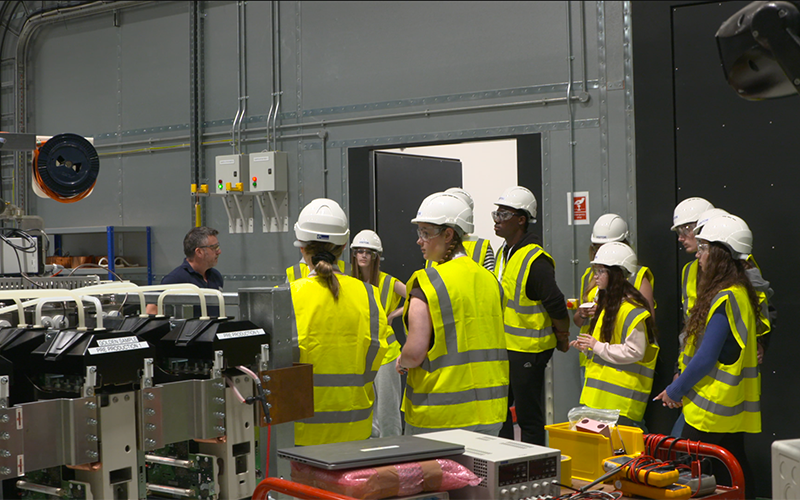On International Women’s Day, GE Foundation honours the contributions of women to innovation and technology.
Rosalind Franklin was a scientist whose pioneering work was central to the understanding of the molecular structures of DNA.
Ada Lovelace, a mathematician, is considered to be the first computer programmer. Yet today, we know there remains an increasing need for STEM uptake from the next generation of talent, particularly from female students, to tackle the many challenges facing the world today, such as climate change.
Clar Collins, Global Operations Leader, Grid Systems Integration at GE, spoke to us about the GE Foundation’s programme launched to increase the diversity of young people in engineering.
At GE, we are passionate about inspiring the next generation of diverse talent. I know first-hand how early engagement at school level can have an impact. As a Mechanical Engineer, I was personally motivated to take up my career after an engineer came to talk at my secondary school. However, uptake – particularly from female students – still remains slow, which is why programmes, such as Next Engineers, are so crucial in changing the industry norm.
A sector in need of change
It’s well-known that the UK’s engineering industry, much like the vast majority of STEM industries, is hugely lacking in diversity, with many groups being underrepresented in the workforce. In fact, according to research by Engineering UK in 2022, only 12% of those working in the engineering sector were women.
This percentage is even lower when considering how many women are currently in ‘core’ engineering roles, and not ‘related’ roles or in industries outside of the typical engineering sector. The same study uncovered that only 23% of A-level physics entrants are female, and only 18% pursued and achieved a degree in engineering and technology at university. With this in mind, it is clear that to encourage more women to take up engineering, equal efforts must be invested during secondary education.
Therefore, the challenge for the industry is how can organisations engage underrepresented groups during their education?
Currently, only 8% of those enrolled in engineering and manufacturing apprenticeships are female, according to the Engineering UK study. To engage young women, equal and ample opportunities must be made available to all students during their education to not only excite them about a career in engineering but prove that it’s a viable path for them.
Changing the norm
GE Foundation’s Next Engineers programme is one of many UK initiatives looking to address STEM uptake from young and diverse students, providing free engineering programmes to help make engineering a viable career for all, irrespective of gender.
To achieve this, three programmes have been rolled out, Engineering Discovery, Engineering Experience, and Engineering Academy, targeting students aged between 13-18, and each tailored to the student’s level of education.
The curriculum is based on engagement, immersion, and representation. So that the students not only get a chance to understand engineering principles and the wide variety of roles within the field of engineering, but also get to work as an engineer on various challenges and are supported by GE engineers who volunteer their time.
The success of these programmes so far has been profound. In its first year, the programme saw over 2,000 students from 11 Staffordshire schools complete Engineering Discovery sessions, with 50% of students identifying as female. Engineering Experience received 234 applications from 27 schools, with 44% of the students indicating that they would be very likely to explore engineering as a career option
In addition to this, Engineering Academy, a three-year further education programme designed to prepare students for higher education, had over 30% of the programme’s cohort identify as female. This success in female uptake was mirrored throughout the year, with 92% of the students retained and 82% currently considering an Engineering degree or Engineering apprenticeship.
A promising future for female engineers
The importance of these statistics cannot be understated. By addressing the lack of diversity at school level, a real difference can be made to increase the diversity within the engineering sector and open career opportunities to ambitious female engineers. As pressing global issues ranging from the built environment to the energy crisis and net-zero targets continue to challenge sectors across the UK, the demand for innovative, diverse engineering talent must grow. By addressing the lack of diversity today, we can ensure engineering offers all young people the same opportunity for an exciting, rewarding, impactful career.




